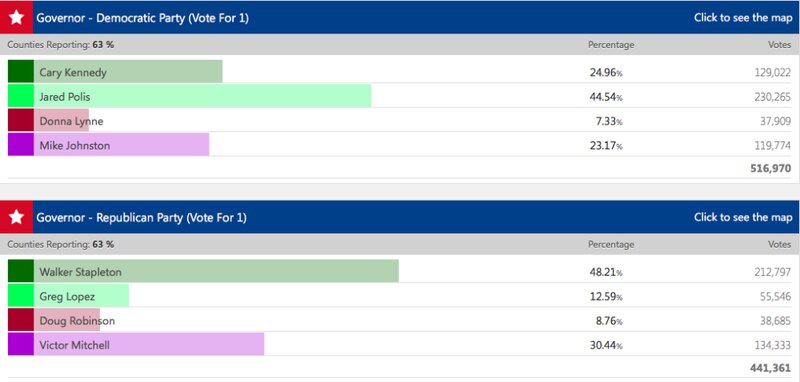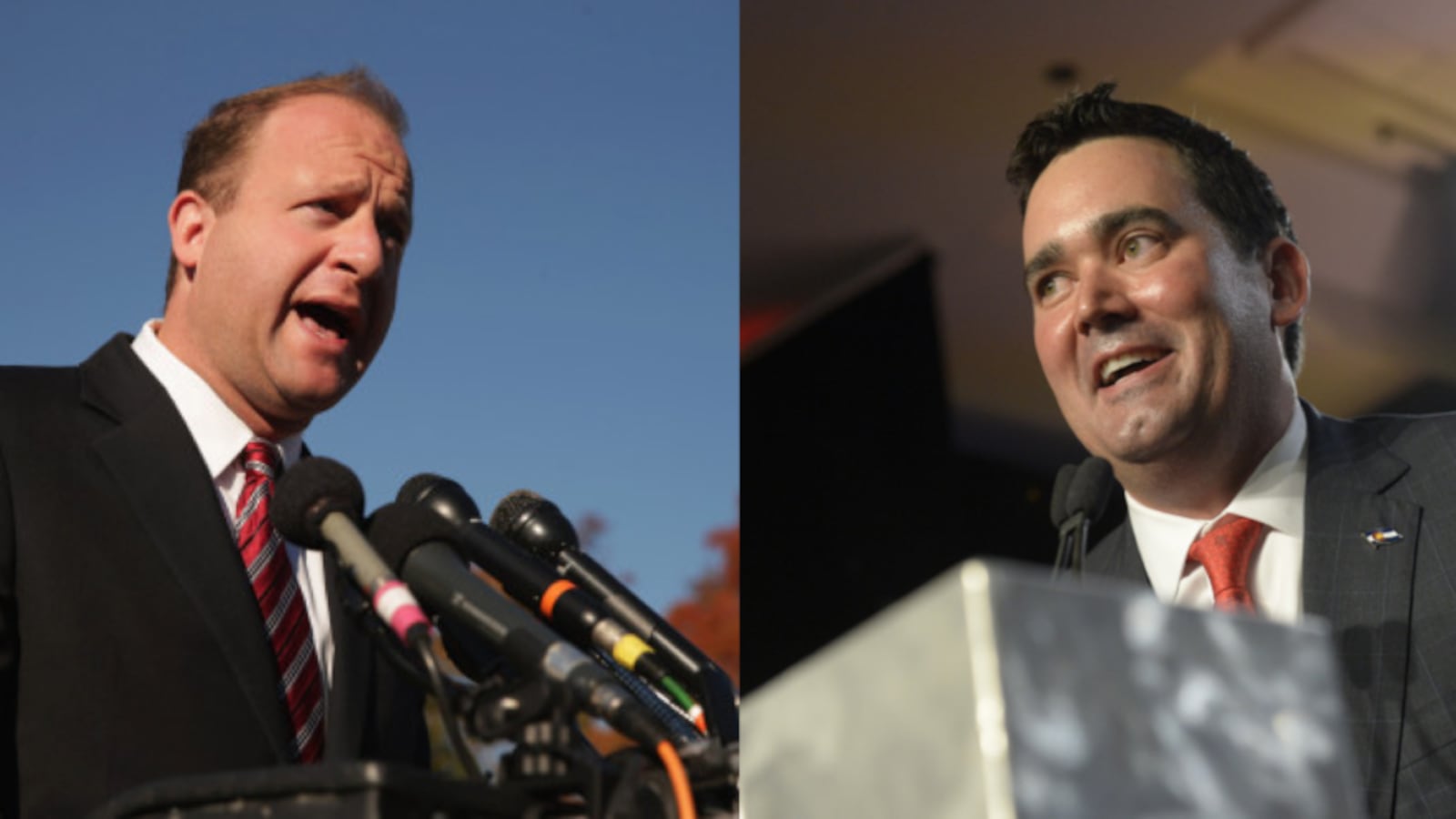After millions of dollars and what sure felt like millions of mailers and door-knocks, Coloradans have their candidates for governor: Democrat Jared Polis and Republican Walker Stapleton.
Education was a major feature of the primary campaign on the Democratic side, as candidates jockeyed to emphasize what amounted to small differences. It was barely mentioned on the Republican side, where candidates focused on immigration, gun rights, and Trump.
Polis, 43, is a five-term congressman from Boulder. An entrepreneur who took his parents’ greeting card company online, Polis went on to found several other internet companies. He previously served on the State Board of Education and founded two charter schools.
Polis took 44 percent of the vote in a four-way primary, with Cary Kennedy, a former state treasurer, coming in second with 25 percent. Former state Sen. Mike Johnston, the architect of key education reform policies in Colorado, finished third with 23 percent of the vote.
Stapleton, 44, is finishing his second term as state treasurer and previously served as the CEO or chief financial officer for a number of private companies. He took 48 percent of the vote in a four-way race after cultivating the support of both hardliners like Tom Tancredo and members of the Republican establishment. Bill Owens, Colorado’s last Republican governor, introduced Stapleton at his victory party.
Polis and Stapleton are seeking to replace Democratic Gov. John Hickenlooper, who is barred by term limits from running again. A Republican last was elected governor in 2002.
Now that we’re on to the general election campaign, here’s what it means for education:
The contrasts are real now
No more parsing statements three ways to see who might oppose vouchers more than another candidate. Polis thinks the most important issue facing schools is a lack of funding. Stapleton thinks schools need to spend their money more wisely and that schools can improve by fostering more school choice.
Here’s what each candidate said when Chalkbeat asked them earlier this month what they would change if they could change one thing about education in Colorado.
Stapleton: “I would like to see every parent have a choice in what school to send their child, regardless of income or ZIP code. The quality of our schools varies drastically not just across the state, but sometimes even within a particular school district. That said, one thing has been shown to be certain: Competition in public education works, and no parent should be condemned to sending their child to a failing public school. Period. We need to make improvements for our public schools as well, but I think this is only effective if we take an all-of-the-above approach to education.”
Polis: “We need to end decades of shameful underinvestment in our public schools. Our schools rank in the bottom tier of education funding nationwide at the same time our economy is booming. While I’m proud our state’s success led to nearly $150 million in one-time funding for the next school year, we cannot budget year-to-year and expect our kids to have the same academic and economic advantages as students in other states where funding is stable. Our current funding strategy undermines our ability to improve outcomes for students through innovative ideas that often result in cost savings and lower class sizes and give our teachers more opportunity to do what they do best: teach.”
Education might not be a huge talking point moving forward, but still could be a weapon
The candidates differ on many issues, from energy policy to immigration to gun rights. It’s not clear that education will emerge as a key issue in the race, especially with Democrats focused on opposing Trump on a variety of fronts. Nonetheless, expect Democrats to link Stapleton’s support of school choice with Education Secretary Betsy DeVos and Republicans to paint Polis as an extremist on, well, everything. Polis has made funding full-day kindergarten and expanding preschool access a key part of his platform, while Stapleton questions how he’ll pay for it.
The teachers unions have some fences to mend
But they’ll probably mend them.
The unions bet big on Kennedy, even as national supporters of education reform sent millions to Johnston. A union-backed independent expenditure committee ran attack ads that painted Polis as a supporter of vouchers (and Johnston as anti-teacher) while Kennedy was portrayed as the true friend of public education.
The Colorado Education Association has a formal process for endorsing candidates, and a committee will need to go through that process again to determine whether to make an endorsement in the general election.
However, partisans tend to put their differences aside after even contentious primaries. Polis might not have been their favorite in the primary, but union members almost always support the Democrat. They also have an interest in defeating Stapleton. As treasurer, Stapleton advocated a pension overhaul that was much less favorable to teachers even than the compromise adopted by the legislature, and he’s suggested the issue needs to be revisited sooner rather than later.
In a blog post, the Colorado Education Association said Kennedy’s campaign put education “front and center” and predicted that would continue to be the case in the general. The post did not make mention of Polis.
Conservatives, meanwhile, suggested the union had wasted their money.
And Democrats for Education Reform, which sat out the primary and took a battering from union loyalists at the Democratic Party’s state assembly, congratulated Polis for “emerging from a hard-fought primary in which every candidate emphasized the importance of high-quality public education for all Colorado students.”
“Colorado voters proved that they want leaders who will do whatever it takes to make sure every student has access to a high-quality public education,” DFER state director Jen Walmer said. “Now the focus must be on coming together to send Jared to the governor’s office and making sure we control both legislative chambers so that we can champion the needs of all families and defend our Colorado values against real threats from the White House.”
This post has been updated with additional comments.


